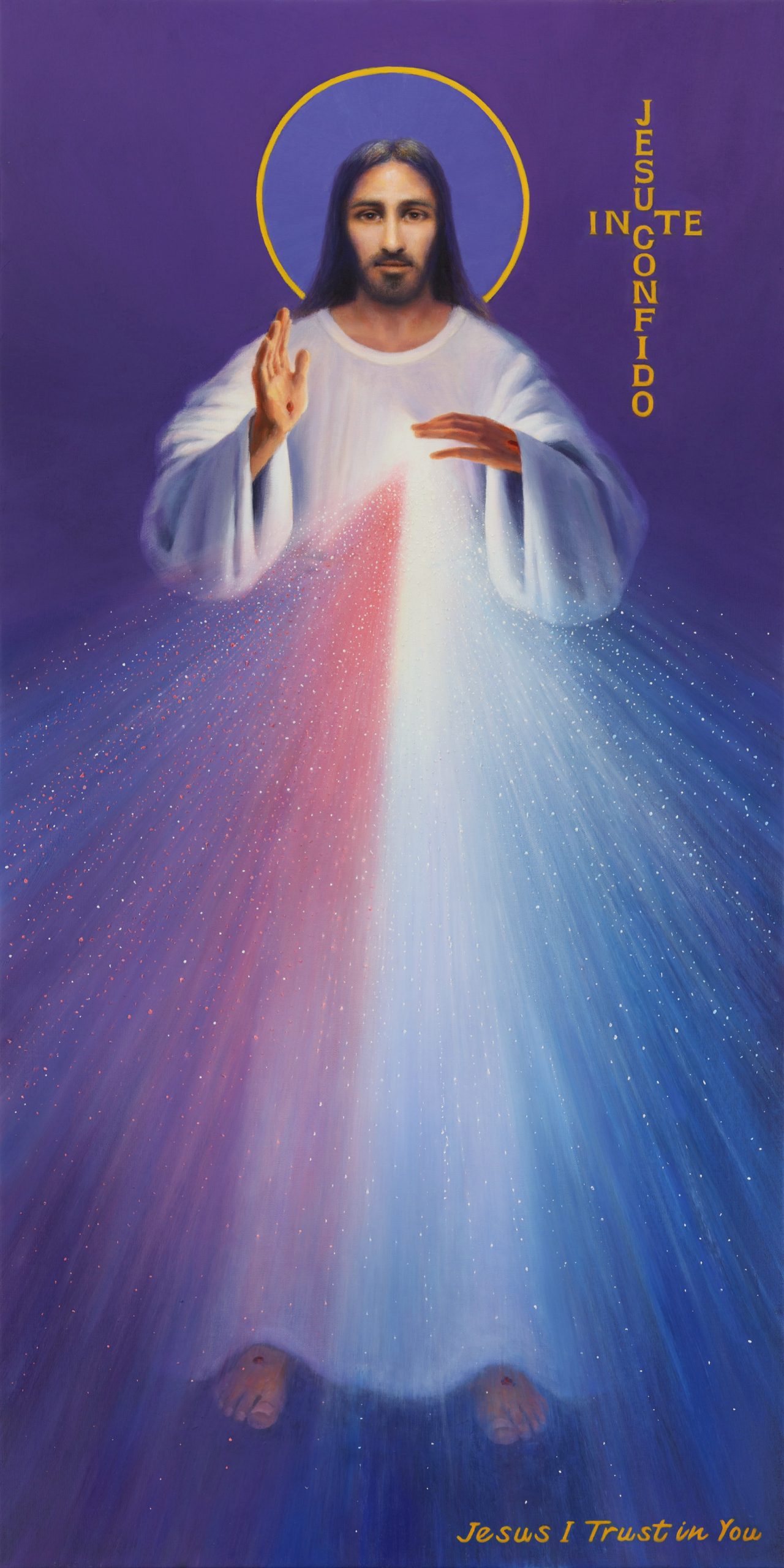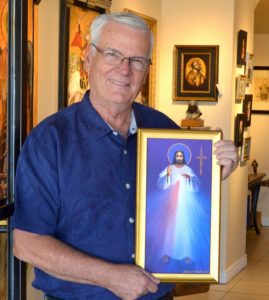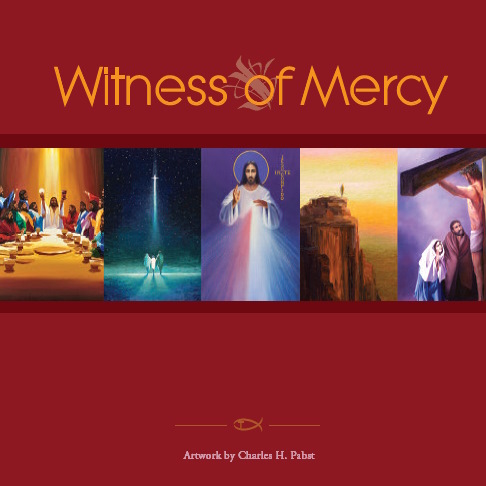Divine Mercy
This new image was painted by artist Charles Pabst following the words of St. Faustina.

"Witness to Mercy" Book by Charles Pabst
58-page Book of Charles Pabst religious paintings with his story of what inspired each image.
Learn more about Charles Pabst's journey, painting the Divine Mercy. Video 4 min.

Framed 7" x 14" image on canvas:
$35, includes shipping. ($60 value)
(Framed size: 9" x 16"). Order here.
The Problem
In this generation – so marked by the culture of death, by fear, by violence, wars, atomic bombs, terrorism, natural disasters, can we afford not to listen to what Jesus told us? Do we not need God’s mercy more and more right now?
The Answer
Benedict told us “It is a really central message for our time: Mercy as the force of God, is the divine limit against the evil of the world.”
The message of The Divine Mercy is simple. It is the Gospel. It is that God loves us – all of us. And, he wants us to recognize that His mercy is greater than our sins, so that we will call upon Him with trust, receive His mercy, and let it flow through us to others. Thus, all will come to share His joy.
This Artist
"For many years I have had a great devotion to the Chaplet of the Divine Mercy, the powerful prayer which proclaims Jesus as the source of Mercy, 'the central nucleus of the Gospel message'. St. Faustina was asked by Jesus to paint his image as she saw him when He appeared to her. She had it painted by a Polish artist, Eugene Kazimirowski.
Being an artist my whole life, I felt compelled to try my hand at creating this remarkable vision of St. Faustina's, following her words, the face on the Shroud of Turin, as well as the original artist's rendition.
"It is my goal to help spread this 'message of mercy' throughout the world." -Charles Pabst, July 2020
The Story
Sister Faustina was a young, uneducated nun in a convent of the Congregation of Sisters of Our Lady of Mercy in Poland during the 1930s. She came from a poor family that struggled during the years of World War I. She had only three years of simple education, so hers were the humblest tasks in the convent, usually in the kitchen or garden. However, she received extraordinary revelations — or messages — from our Lord Jesus. Jesus asked Sr. Faustina to record these experiences, which she compiled into notebooks. These notebooks are known today as the Diary of Saint Maria Faustina Kowalska, and the words contained within are God's loving message of Divine Mercy.
Though the Divine Mercy message is not new to the teachings of the Church, Sr. Faustina's Diary sparked a great movement, and a strong and significant focus on the mercy of Christ. Saint John Paul II canonized Sr. Faustina in 2000 making her the "first saint of the new millennium." Speaking of Sr. Faustina and the importance of the message contained in her Diary, the Pope called her "the great apostle of Divine Mercy in our time."
The Image
In 1931, our Lord appeared to St. Faustina in a vision. She saw Jesus clothed in a white garment with His right hand raised in blessing. His left hand was touching His garment in the area of the Heart, from where two large rays came forth, one red and the other pale. She gazed intently at the Lord in silence, her soul filled with awe, but also with great joy. Jesus said to her:
Paint an image according to the pattern you see, with the signature: Jesus, I trust in You. I promise that the soul that will venerate this image will not perish. I also promise victory over [its] enemies already here on earth, especially at the hour of death. I Myself will defend it as My own glory (Diary, 47, 48). I am offering people a vessel with which they are to keep coming for graces to the fountain of mercy. That vessel is this image with the signature: Jesus, I trust in You (327). I desire that this image be venerated, first in your chapel, and [then] throughout the world (47).
At the request of her spiritual director, St. Faustina asked the Lord about the meaning of the rays in the image. She heard these words in reply:
The two rays denote Blood and Water. The pale ray stands for the Water which makes souls righteous. The red ray stands for the Blood which is the life of souls. These two rays issued forth from the depths of My tender mercy when My agonized Heart was opened by a lance on the Cross. Happy is the one who will dwell in their shelter, for the just hand of God shall not lay hold of him (299). By means of this image I shall grant many graces to souls. It is to be a reminder of the demands of My mercy, because even the strongest faith is of no avail without works (742).
These words indicate that the Image represents the graces of Divine Mercy poured out upon the world, especially through Baptism and the Eucharist.
Many different versions of this image have been painted, but our Lord made it clear that the painting itself is not what is important. When St. Faustina first saw the original image that was being painted under her direction, she wept in disappointment and complained to Jesus: "Who will paint You as beautiful as You are?" (313).
In answer, she heard these words: "Not in the beauty of the color, nor of the brush lies the greatness of this image, but in My grace" (313).
So, no matter which version of the image we prefer, we can be assured that it is a vehicle of God’s grace if it is revered with trust in His mercy.

